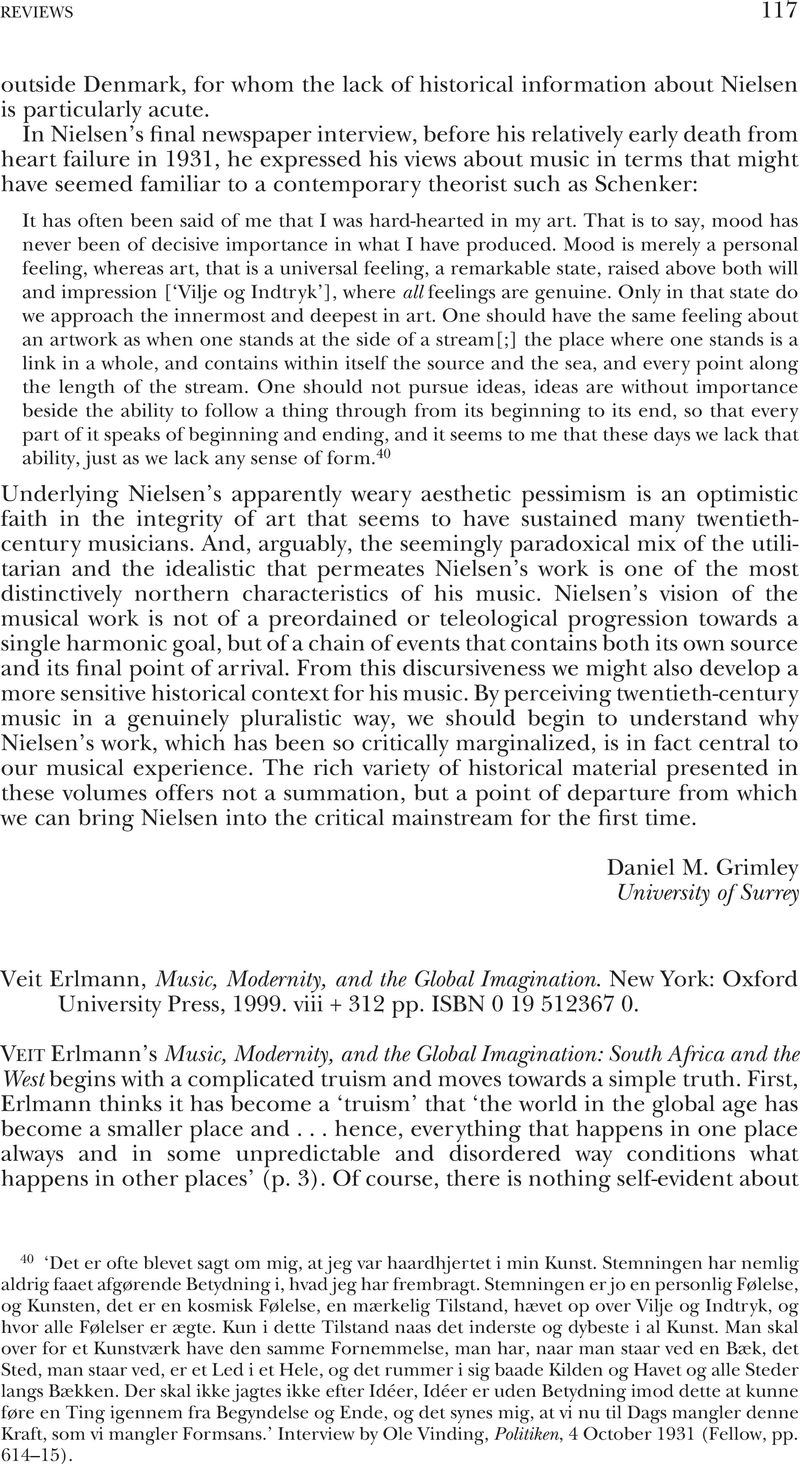Published online by Cambridge University Press: 01 January 2020

1 Pratt, Mary Louise, Imperial Eyes: Travel Writing and Transculturation (London, 1992).Google Scholar
2 For an extended account of this complicity, see Theodor W. Adorno and Max Horkheimer, Dialectic of Enlightenment, trans. John Cumming (New York, 1997).Google Scholar
3 For Nelson Mandela, ed. Jacques Derrida and Mustapha Tlili (New York, 1987).Google Scholar
4 Euba's remarks were composed as talking points for a symposium entitled ‘Revitalizing African Music Studies in Higher Education’, University of Michigan, Ann Arbor, April 2000.Google Scholar
5 Spivak, Gayatri Chakravorty, A Critique of Postcolonial Reason: Toward a History of the Vanishing Present (Cambridge, MA, and London, 1999), 376.CrossRefGoogle Scholar
6 Erlmann repeats the fact of his methodological preoccupation with cultural dimensions to the exclusion of structural-economic ones at numerous points in his text. For example, in Chapter 2 he writes: ‘the effort to illuminate the emerging global imagination of colonizers and colonized at the end of the nineteenth century must be embedded less in the analysis of the overall power structures, economic strategies, and political discourses of the colonial world than in the interpretation of its rituals, routines, and representations’ (p. 35). What Erlmann fails to acknowledge is that without setting the economic/political analysis actively to work in his text, the hermeneutic/cultural analysis becomes unconsciously beholden to some version of the former without bringing it into thematic focus. By creating a lack of critical interest in itself, the economic/political scenario becomes a surrogate absolute driving the argument.Google Scholar
7 Edward Said, Culture and Imperialism (New York, 1993); Will Straw, ‘Popular Music and Postmodernism in the 1980s’, Sound and Vision: The Music Video Reader, ed. Simon Frith, Andrew Goodman and Lawrence Grossberg (London, 1993), 10–11; Lawrence Grossberg, We Gotta Get Out of this Place: Popular Conservatism and Postmodern Culture (New York, 1992); John Shepherd and Peter Wicke, Music and Cultural Theory (Cambridge, 1997).Google Scholar
8 See Hountondji, Paulin, African Philosophy: Myth and Reality, trans. Henri Evans (London, Melbourne, etc., 1983), and Mahmood Mamdani, Citizen and Subject: Contemporary Africa and the Legacy of Late Colonialism (Princeton, NJ, 1996).Google Scholar
9 On the imperial interest in the strategic invention of tribalism in Africa, see Ranger, Terence, The Invention of Tribalism in Zimbabwe (Gweru, Harare and Gokomere, 1985).Google Scholar
10 See Selected Subaltern Studies, ed. Gayatri Chakravorty Spivak and Ranajit Guha (New York and Oxford, 1988).Google Scholar
11 Ibid., 3–32.Google Scholar
12 This remark was one of the talking-points for the symposium entitled ‘Revitalizing African Music Studies in Higher Education’, University of Michigan, Ann Arbor, April 2000.Google Scholar
13 The World of Music: Journal of the International Institute for Traditional Music, 35 (1993), 3–15 (p. 11).Google Scholar
14 Ibid.Google Scholar
15 On the invention of African rhythm, see Agawu, Kofi, ‘The Invention of “African Rhythm”’, Journal of the American Musicological Society, 48 (1995), 380–95.Google Scholar
16 For a detailed analysis of the aesthetic dimensions of mbira music and their relation to ancestral spirit worship, see my ‘Negotiating the Music Theory/African Music Nexus: A Political Critique of Ethnomusicological Anti-Formalism and a Strategic Analysis of the Harmonic Patterning of the Shona Mbira Song Nyamaropa’, Perspectives of New Music (forthcoming, 2001).Google Scholar
17 Schenker, Heinrich, Harmony, trans. Elisabeth Mann Borgese (Chicago, IL, and London, 1954), 9.Google Scholar
18 Ibid.Google Scholar
19 Ibid., 10. In his book African Rhythm: A Northern Ewe Perspective (Cambridge, 1995), Kofi Agawu also argues against the idea that subtle deviations are somehow peculiar to African music. He makes the argument in the context of the politics of using staff notation to represent African music: ‘The idea that notes are “fixed” on the staff, and that this somehow distorts the African practice of sliding between notes (or of singing quarter tones, for example) is undermined by the fact that within Western practice itself, in particular in the string and vocal repertoires of the eighteenth and nineteenth centuries, the note as represented and the note as heard are invariably different’ (p. 187).Google Scholar
20 Schenker, , Harmony, 11.Google Scholar
21 Symptomatically perhaps, the clause with the musical metaphor of ‘strident tonalities’ appears again later in Erlmann's text with the referent ‘antiapartheid struggle’ excised. He writes: ‘the more strident tonalities of isicathamiya … are being excised from contemporary discussions of Graceland ’ (p. 211). The practice of strategic ‘excision’ seems to bedevil more contemporary discussions of Graceland than the author realizes!Google Scholar
22 In May 2000 the Supreme Court of Appeal upheld the conviction of Boesak and sentenced him to three years in prison. This conviction halved a sentence given in 1999. I should add here that Paul Simon's contributions to the preservation of African music were considerable and included the funds for setting up Ghana's Folklore Board on Copyright.Google Scholar
23 Erlmann's description of ‘this sort of bow music’ has no definite reference at this point in the text and thus probably recalls the Xhosa uhadi bow music discussed in the first section of the book.Google Scholar
24 Dargie, David, Xhosa Music: Its Techniques and Instruments, with a Collection of Songs (Cape Town and Johannesburg, 1988), 79.Google Scholar
25 Dargie, , Xhosa Music, 79–81.Google Scholar
26 Coyle, Diane, ‘Internet helps make the world more unequal than it has ever been before’, The Independent, 12 July 1999, 10.Google Scholar
27 Benjamin, Walter, Illuminations, trans. Harry Zorn (New York, 1968), 241.Google Scholar
28 As one writer put it during Gay Pride 2000 in New York City, ‘Today's gay boy is … a self conscious commodity, willing to accept objectification if the compensation is fair’ (Richard Guichard, ‘I Hate Older Men’, Village Voice: The Queer Issue, 27 June 2000, 75).Google Scholar